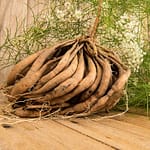Ever heard of the phrase ‘she who has a hundred husbands’? The single word for this phrase is Shatavari. Known by different names like Shatavar, Narayani and Shatamuli, Shatavari is a potent aphrodisiac according to Ayurveda, especially beneficial for the female reproductive system. It is also known as the ‘Queen of Herbs’ due to its ability to inculcate love, devotion and happiness. It is useful in treating numerous disorders like seet veeryam, soma rogam and Madhur rasam. Vagabhata’s Ashtang Hridyam and Charaka’s Charaka Samhita mention the innumerable benefits of Shatavari to the female reproductive system. Thereby it is popular as a female tonic just like Withania is known for males.
Shatavari is a species of Asparagus and its botanical name is Asparagus racemosus. However, do not confuse it with the Asparagus we might eat in our lunch or dinner. Racemosus is an ayurvedic rasayanam which is useful in improving vigour, preventing ageing, enhancing immunity and treating numerous nervous disorders and tumours. It is known as buttermilk root in English.

Plant Anatomy And Distribution
Asparagus racemosus is endemic to India and Sri Lanka and is especially found in the Himalayas as it grows on rocky and gravelly mountain soil at an elevation of about 1300-1400 m. The climber like herb belongs to the family Asparagaceae and grows about 1 to 2 m tall. Sometimes also found in parts of Australia and Africa, the demand for Shatavari is increasing day by day which has also led to its endangerment in its own habitat.
Being a mountainous herb, Shatavari has pine-like needle-shaped flattened branches also called phylloclades. The branches which are mostly shiny green in colour produce small white flowers in July and black-purple berry-like fruits in September.
Shatavari: Uses And Properties
Shatavari has also been credited with the ability to cure a hundred diseases in the ancient texts. The properties of Shatavari which make it an immensely useful herb are:
- Antispasmodic
- Appetizer
- Stomach Tonic
- Aphrodisiac
- Galactagogue (promotes the flow of a mother’s milk)
- Astringent
- Antidiarrhoeal
- Anti dysenteric
- Antidiabetic
- Laxative
- Anticancer
- Diuretic
- Rejuvenating
- Carminative
- Stomachic
- Antiseptic
- Tonic
- Anti-inflammatory
- Blood purifier
- Antitubercular
- Antiepileptic
- Demulcent
- Immunomodulatory
- Improves mental function
Shatavari can help in the treatment of many disorders like:
- Female reproductive and hormonal issues
- Gastric ulcers and acidity
- Indigestion
- Inflammation
- Dyspepsia
- Diarrhoea
- Dysentery
- Tumours
- Infections
- Bronchitis and cough
- Hepatopathy
- Nervous system disorders
- Heartburn
- Alcohol withdrawal
- Anxiety
Such wonderful properties of Shatavari are because it contains a number of phytochemical constituents.
- Steroidal saponins which are natural glycosidic compounds. They are also called Shatvarins.
- Oligospirostanoside
- Polycyclic alkaloid-Aspargamine A
- Racemofuran
- Polysaccharides, mucilage
- Flavanoids
- Sterols
- Minerals like zinc, manganese, copper-cobalt, calcium, magnesium, potassium zinc and selenium
- Other essential fatty acids
Did You Know?
There exists a Shatavar Vatika Herbal Park in Hisar, Haryana named after Shatavari. The 125-acre park has been set up for the preservation of endangered Ayurvedic herbs and conducting research.
Ayurvedic Properties of Shatavari
Charaka in Charaka Samhita categorises the herb as:
- Madhura Skandha – herbs that taste sweet
- Vayasthapana – herbs that give anti-ageing effects
- Balya – herbs that promote vitality, strength and immunity
Vagabhatta categorises the herb as Vidarigandhadi which means a group of herbs in Ayurveda with the ability to subdue the effects of an increased Vata and Pitta.
Sushruta calls the herb:
- Vidarigandhadi
- Pitta Shamaka – a herb that balances Pitta
- Kantaka Panchamula – means a group of medicinal thorny shrubs.
The major Ayurvedic properties or Gunadharma of the herb are:
- Physical property (Guna) – light, penetrative and dry
- Taste (Rasa) – bitter, sweet
- Potency (Veerya) – shita or cool
- Conversion after digestion (Vipaka) – sweet after digestion
- Effect on doshas – works mostly on decreasing Vata and Pitta and increases Kapha
Dosage Information
Shatavari is widely available in the market in the form of powder or tablets. The packages might often be labelled as ‘Asparagus extract’. People must keep in mind the difference between Shatavari and the common vegetable asparagus.
The common dose of Shatavari is:
- 500 mg to 1000 mg per day
- 4-5 ml Shatavari root tincture three times a day
- Tea made of 1 teaspoon powdered root of Shatavari. Drink it twice daily.
- 30 drops of Shatavari extract up to three times a day
However, this cannot be recommended as a standardized dosage and it is always better to visit a medical practitioner before consuming Shatavari.
Shatavari Kalpa
Shatavari Kalpa is an Ayurvedic health tonic or health drink and is beneficial for all alike. Herb called Velchi is added to provide aroma and flavour to the drink. The drink can be useful in hyperacidity and female reproductive issues. It can also be used as a food supplement.
Manyfold Benefits Of Shatavar

Antioxidant
Anto oxidants are substances which help in relieving oxidative stress and removal of free radicals from the body. Free radicals are often the cause of many benign and malignant tumours which can become cancerous. Shatavari is rich in saponins which act as antioxidants. A 2004 study detected the presence of antioxidants like racemofuran, asparagamine A and racemosol in the Shatavari root.
Female Reproductive Health
Though Shatavari provides all-round benefits, it is most popular for its positive effects on the female reproductive system. Shatavari works wonders from menarche to menopause in the following ways:
- Ayurvedic texts mention Shatavari’s diuretic character, that is it works as muscle relaxant especially when affected with uterine cramps during the ongoing menstrual cycle. This way it can also help in relieving other kinds of stomach aches.
- The major benefit that a woman gets through Shatavari’s diuretic property is that it can save a pregnant woman from a miscarriage which occurs due to sudden uterine contractions.
- If planning for a baby, Shatavari proves to be highly beneficial as it helps in balancing the pH of the vagina, produces enough luteinizing hormone for ovulation and controls the production of estrogen.
- Shatavari also works as a galactagogue by helping in increasing milk production in lactating mothers.
- When a woman reaches her menopause, the estrogen level in the body decreases and this might lead to several menopause-related issues like hot flashes, mood swings, vaginal dryness and night sweats. However, Shatavari’s phytoestrogen component helps in overcoming these problems.
Suggested Remedy: Swami Ramdev recommends a remedy for women who face problems of low milk production and underdeveloped breasts. He suggests consuming around 2 gram each of powdered Shatavari along with powdered Jeera (cumin) after delivery.
Anti-Inflammatory
Shatavari contains a phytochemical called racemofuran which gives effects similar to various other anti-inflammatory drugs. Hence Shatavari can be used in the treatment of disorders like gouty arthritis and can provide relief from swellings.
Is good for the digestive system
Asparagus racemosus has been used in the Ayurvedic system of medicine to cure numerous abdominal issues like peptic ulcers. If someone is affected by duodenal ulcers, one must consume fresh juice of the Shatavari root. When coupled with Terminalia chebula or harad, Shatavari can help protect the intestinal lining or the gastric mucosa.
Shatavari also aids faster digestion as it works as a catalyst by helping increase the activity of digestive enzymes amylase and lipase. Lipase aids the digestion of fats and amylase the digestion of carbohydrates.
Immunomodulatory
Ayurveda mentions the immunomodulatory effects of Shatavari which are confirmed by a 2004 study. The study states that animals affected by whooping cough when given Shatavari demonstrated a rise in the production of antibodies as compared to the untreated animals.
Urinary Stones
Asparagus racemosus’ diuretic property is also helpful for people affected with urinary stones. Shatavari’s regular consumption helps in dissolution of the stones and also help in the prevention of formation of stones in future.
Suggested Remedy: Acharya Balakrishna recommends consumption of decoction of Gokhru and Shatavari regularly if affected with urinary or kidney stones. This decoction also helps in keeping the kidneys healthy in general.
Good For The Heart
Cardiovascular diseases, often termed as lifestyle diseases have become so prevalent that today they are one of the major reasons for death. It is recommended to consume Shatavari root powder if affected with heart-related conditions. It contains flavonoids, saponins and ascorbic acid which along with being powerful antioxidants also help in flushing out cholesterol, preventing its buildup in the arterial walls.
Beneficial For The Respiratory System
People of West Bengal, India drink juice of Shatavari root when affected by cough and cold. Even researchers have concluded that Shatavari helps in halting the cough production in the body.
Suggested Remedy – Acharya Balakrishna suggests a remedy for cough. According to him, if a person suffers from excess cough, they must consume a decoction of Shatavari and Peepli to immediate relief.
Helps in reducing anxiety and stress
Anxiety and stress have become common issues affecting every section of the population and are now prevalent in every age group. However, as simple these terms sound, their effects can be fatal as too much stress affects the functioning of other organs too and might even lead to early death in some severe cases. Shatavari is an excellent herb which can help people handle the pressures of day to day life. Cellular and Molecular Neurobiology published a study in 2014 mentioning that Shatavari can help reduce stress and anxiety in rats due to its interaction with the stress-causing components – serotonin and gamma-aminobutyric acid (GABA). Shatavari also works as an antidepressant.
Side Effects And Precautions
A 2003 research states that Shatavari is completely safe for consumption even for pregnant and lactating women. However, it can have certain side effects and some patients must take precautions:
- Some people who are sensitive to asparagus can suffer several allergic reaction symptoms like skin rash, fast heart rate, itchy eyes, dizziness, difficulty breathing and pulmonary allergic reactions.
- Certain people might also gain weight.
- Patients suffering from kidney or heart-related problems must refrain from consuming Shatavari.
- Since it is assumed that Shatavari contains phytoestrogens (compounds that have estrogen-like effects on the body) therefore people with hormonal sensitivity like uterine fibroids and endometriosis must avoid consuming Shatavari.
- Shatavari gives diuretic effects and hence should not be consumed with other diuretic drugs like furosemide.
- Shatavari lowers the blood sugar level. Therefore it is better to stop consuming it before going for a surgery. Diabetic patients must also not consume Shatavari along with their prescribed drugs to avoid any contradictions. They must first obtain a suggestion from a doctor.
Shatavari must never be taken in very high dosage until one has consulted a doctor as not many studies are there to establish its effects in certain cases.
